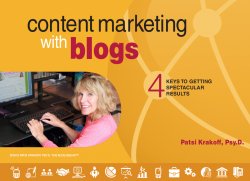 Why do people decide to buy a product online? How is it they decide to trust the information you provide, and register to download information from your blog or website? What can we learn from brain science?
Why do people decide to buy a product online? How is it they decide to trust the information you provide, and register to download information from your blog or website? What can we learn from brain science?
This is something that intrigues me. I read a lot of research on motivation, decision making, and neuroscience to try to figure out how brain science can be applied to better content marketing.
The problem is not what you might think. We know enough about the brain and marketing today to realize people are influenced by unconscious feelings, as much as they are by logic and reasons.
Any professional who has studied content marketing and copywriting knows that you must use emotional stories to get people to take action.
The problem for content creators is that so much of what influences and persuades is unconscious and specific for each reader. Everybody’s different, and you can’t possibly address each reader’s wants and desires.
What are the unconscious reasons for people’s actions, how do their emotions affect decisions, and how can professionals apply the principles of persuasion to create content that encourages users to take action?
“Neuro-marketing” concepts are at the intersection of psychology and reader experience.
If you need to apply research from the brain and research from psychology and marketing to web pages, landing pages, custom magazines, and content designed to persuade people to take action, these tips can help.
Here are ten key triggers that help influence readers to take action. Which are you using the most?
- The power of social validation: Stories and testimonials provide readers with reassurance that you can be trusted
- Feeling indebted: the law of reciprocity, giving away freebies: You gain trust by being generous and helpful
- Scarcity, urgency: People won’t take action unless you ask and give them a deadline or bonus to act now
- If too many choices, marketing backfires: Many web pages offer too many choices, and a confused reader will click away
- Attention: Danger, sex and food are primitive desires that get our attention and energize us to action
- Commitment & consistency: Repetition and consistency builds trust
- Likability, similarity, attractiveness: We trust others like ourselves
- Fear of loss, either materially or socially: We want to belong and we don’t want to feel “less than”
- Pictures and stories engage the imagination: These are strong ways to access the subconscious mind
- Opportunities to connect and be social: We are social animals and love to give our opinions and interact with others
Can you think of other ways to connect and engage with readers, build trust, and gain their participation in your offers?














Recent Comments